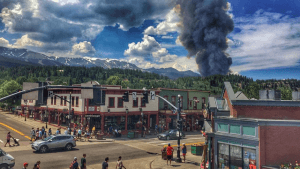Although the mountain real estate market is hot, unfortunately the heat I’m referring to is definitely not welcome news to property owners. I saw the news last night “the entire town of Breckenridge was placed on a pre-evacuation notice”(Summit Daily). Would you know if your property were threatened & what to do? 5 tips to take today and 5 tips to mitigate the loss after the embers cool. I unfortunately have been through a number of evacuations and also lost properties in various wildfires throughout Colorado so I’ve gained more experience than ever desired in this topic.
You are probably wondering why a private lender like myself is writing about wildfires in Colorado (the below is applicable to almost anyone in the western states). As a Colorado resident, in one summer we got evacuated 3 times due to wildfires in the area. As a lender we have almost lost numerous properties to wildfires and have witnessed the financial ruin that it can cause. Fortunately, there are a number of simple steps that commercial and residential property owners can take to protect both themselves (and family) and their properties.
I wanted to share some key learnings with each of you since I’ve now experienced a number of evacuations (this is not some canned list I found online). Many people don’t realize that a wildfire is not bound to just mountainous areas. Who would have thought there would be a wildfire threatening the picturesque mountain town with snow peaks of Breckenridge? Unfortunately, location doesn’t preclude a fire; for example, the fire in CO Springs last year was not far out of downtown and hundreds of homes were lost in a matter of hours (there have been wildfires in the past in boulder city limits, castle rock, and now Breckenridge, etc…). Are you prepared?
Here are 5 tips to help prepare yourself and your family for a situation like this. These steps should be taken now before you receive the call
1) Make sure you actually sign up for your counties reverse 911, many of the county systems are just plain wrong with their location software. If you do not make sure your info is accurate, you may never get the phone call to evacuate. In your county system log in and confirm your address, put in your cell phones, office, e-mail, etc… I can tell you we don’t have a home phone so you want to get the notification. Here is a link to Summit County reverse 911: http://www.co.summit.co.us/1149/Summit-County-Alert Each county is unique so you will need to go to the respective county where the property is located.
2) Take time before a fire to think about what you would take if you had 10 minutes to load up and leave. Make a list of the items and stick to the list (in the wildfires last year, there were some folks who did not leave immediately and tried to load up one more item… some didn’t make it out). For my family, we actually created a “fire box” with important docs, pictures, etc… all in one big bin that we can grab and go if needed. There is a list on top of the box so we don’t forget certain items. Laptop, wallet, keys, medications, etc… We also have two young kids, we need to make sure we had their blankets and other items. Also, don’t forget about the pets (we have two large shepherds) and any items they require
3) Think about the route you would take to exit your neighborhood or area. In the case of our neighborhood, there are at least 3 or 4 ways out to access a main street. Think how you would exit quickly if one of the routes was blocked?
4) Is your insurance up to date? If you look historically at the recent fires throughout Colorado, one of the biggest issues is that a number of the houses lost were considerably underinsured. I went through an exercise this winter with my insurance agent where I went through each room in the house and designated floor coverings (hardwood, carpet, etc..), upgrades (rock fireplace, new cabinets, etc…). After going through this exercise I found out I was about 30% under replacement cost, I subsequently increased my insurance to cover this. Understand that replacement cost could be more than the current market value of your house
5) Use common sense. It is amazing how some people react in situations. I saw one of my neighbors as we were pulling out of our driveway loading up his car to the brim; he had lamps, pillows, etc… I can tell you I wouldn’t risk my life for a lamp. At the end of the day property is replaceable.
I hope the above 5 tips gets everyone thinking so they are better prepared if a wildfire or other disaster strikes near them. Feel free to pass this on to your associates or link to it on my blog www.ColoradoHardMoney.com
Resources:
- 5 tips for every property owner to help mitigate the loss from a natural disaster.
- Wildfire season are you prepared: 5 tips to take now to ensure you and your families safety
- Are you properly insured? Tax value, market value, replacement cost what is the difference
- Summit Daily: Breckenridge Wildfire
- Durango Herald: Lightner fire costs over 2m to fight
